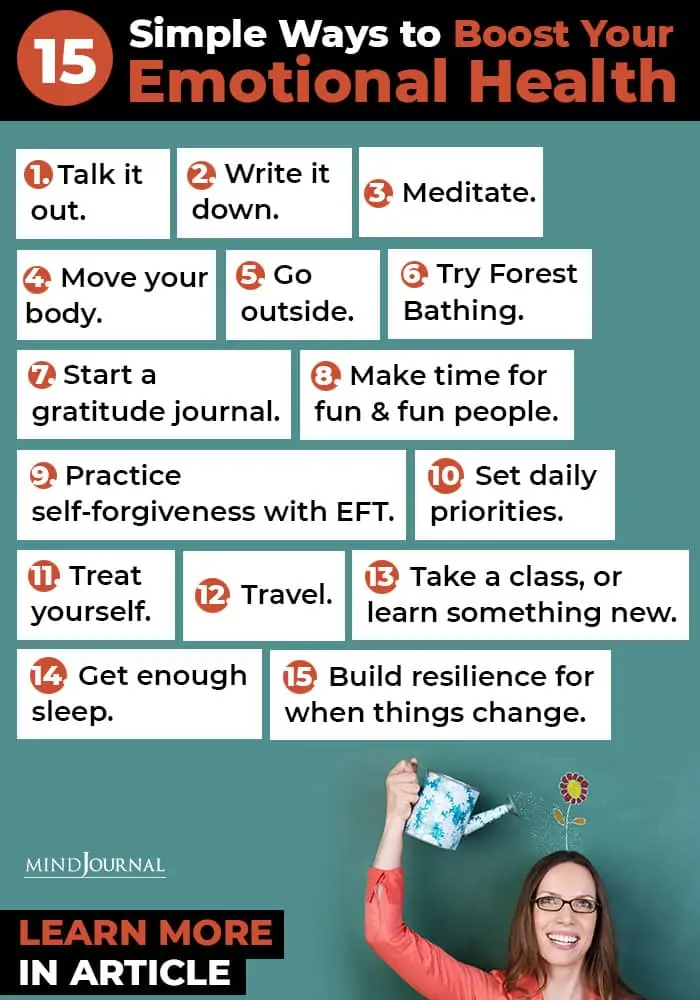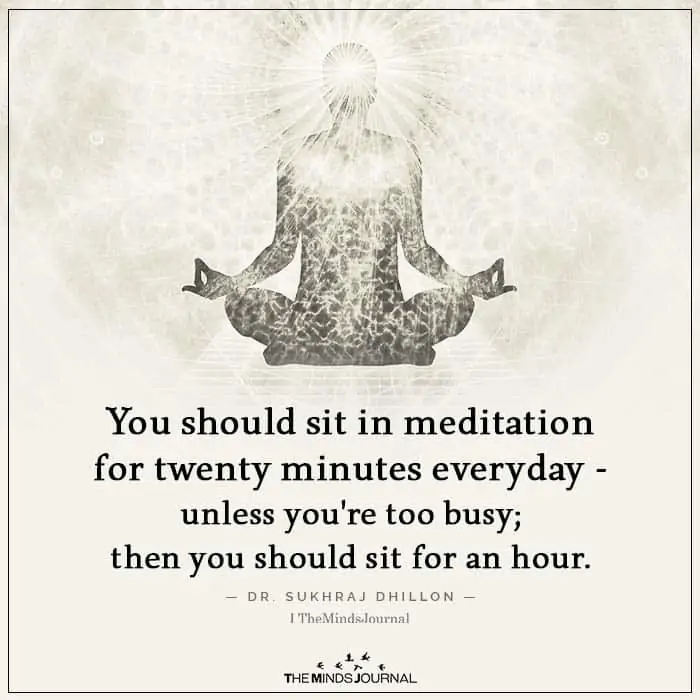Emotional health is one of the most important things to take care of, but sometimes it proves to be a challenge. This is why, there are a few simple things you can do daily to boost your emotional health, without creating too much inconvenience.
Our emotional health can be defined in many ways, and because it is subjective and specific to each person, one simple definition doesn’t always cut it. However, we can begin to understand emotional health as it relates to our thoughts, feelings, and behaviors, and how we’re able to best control these when they no longer serve us efficiently.
According to Dan Eisenberg, a sports psychologist at OffshoreSportsbooks.com, nearly 18% of the US population experiences an emotional health issue.[1]
Emotional health, when left unchecked, manifests in the physical body in the forms of muscle tension, fatigue, and dis-ease. When we’re facing stress, sadness, or anger, embracing habits that teach us how to cope with these emotions and the thoughts that accompany them can be powerfully effective in keeping our entire being strong, happy, and healthy.
Here Are 15 Simple Ways to Boost Your Emotional Health

1. Talk it out.
One of the quickest ways of releasing pent-up emotions is to talk it out, whether that’s with a friend, family member, or someone neutral, like a therapist or counselor.
Fixing the problem during these conversations is not necessarily the goal; instead, venting or releasing words that surround the problem is one healthy way of expressing how you feel. Usually, solutions arise on their own out of this release, but the sole act of giving a voice to your emotions is a good start.
2. Write it down.
If speaking to someone makes you uncomfortable, writing down your thoughts and emotions as they arise is another healthy habit. This practice of journaling helps you put your words down on paper in a way that is safe, secure, and personal.
It also gives your feelings and thoughts an outlet that you may or may not decide to share with others, but the act of providing that outlet is healthier than keeping feelings bottled up.
Related: 6 Ways To Build Emotional Resilience and become Unfuckwithable
3. Meditate.
Meditation has long been proven to help reduce stress and tension. In a 2016 study, 76% of people questioned about their meditation practice claimed that it helped their general wellness tremendously, with 60% reporting that it increased their energy, and 50% reporting that it helped their memory and focus.[2]
Sitting down in a meditation practice allows you to observe the feelings and thoughts that come up, and then detach from letting them fester into growing problems. The practice teaches you how to distance yourself from the emotional chaos we tend to find ourselves in, long enough to create space in which to simply be.

4. Move your body.
Whether this is in a yoga practice or a gym exercise routine, moving the body has tremendous ties in how that affects our emotional response, and in turn, health.
Depending on what you may be feeling or going through at the time, stepping into a mindful movement with the body can pull you out of that thinking loop, and back into a physical connection.
As long as you’re mindful and aware of the movements you’re doing, you’re giving your mind something to focus on. Likewise, you’re giving your emotional health a dose of serotonin, the feel-good chemical that contributes to feelings of wellness and general happiness.[3]
5. Go outside.
Nature has such a powerful effect on the body, mind, and soul. We spend so much time indoors, because of our jobs, families, responsibilities, and so forth, that we don’t take the time to really tap into the simple idea of being outside.
Whether you make a routine of taking a brief walk outside during your lunch break or just stepping out to enjoy some fresh air for a few minutes on a park bench nearby, these simple habits, over time, can truly refresh and reset you for prime emotional health.
6. Try Forest Bathing.
While we’re on the topic of being outside in nature, forest bathing is an incredible practice to implement. Called Shinrin in Japanese, forest bathing has made its way westward to pull people into the simple union with nature and its many benefits.[4]
Simply find a forest or nearby location where you can get away from the noise of the city – a park, wooded trail, etc. Unplug and leave your phone, camera, and any other technology in the car. As you’re walking, be all there! Listen to the sounds around you, feel your feet on the ground, and become deeply aware of the sensations around you and within you.
This practice is meant to disconnect you from constantly chasing down the future, and put you back into the present moment – the only one that truly matters.
You can learn more about forest bathing in the video below:
7. Start a gratitude journal.
It’s so easy to get sucked into the thought loop that we’re not doing enough, or that we have so many items to yet tick off of our to-do list before the day is done. However, this thought loop breeds a thought reality that keeps us chained to anxiety, depression, and a slew of other negative nasties.
In order to tap into all that you have done and accomplished in a single day, begin a gratitude journal. Before you go to sleep at night, write down a list of things and people for which and whom you’re grateful. Be specific and as lengthy as you’d like, and then look over the list to truly embrace all that you do have in your life.
Related: 6 Positive Psychology Practices To Boost Happiness and Improve Your Life
8. Make time for fun and fun people.
We work too hard, and no play really makes for unsteady and unbalanced emotional health. We’re active and social creatures who need to be around others, enjoying the many perks that life has to offer.
Make it a point to schedule fun time with friends, at least once per month. If you schedule it ahead of time and get it on everyone’s calendar, chances are that you won’t get bogged down with other priorities. After all, fun should still be a priority, even in adulthood!
9. Practice self-forgiveness with EFT.
Emotional Freedom Technique (EFT) is a form of psychological acupressure, or also known as Tapping.[5] It has been used to alleviate physical and emotional pain and works wonders on self-forgiveness.
We’re often too hard on ourselves. In a deadline-demand-driven society, we subconsciously load ourselves up on expectations that lead to failure, disappointment, and then suffering. EFT allows you to tap into the physical meridians where we hold this emotionally manifested pain, in order to release and forgive.
10. Set daily priorities.
When we’re overwhelmed with work, we tend to dive deep into stress. This may result in stressful eating, poor exercise regimens, and an overall lack of motivation and energy. All of this quickly leads back to that same emotional loop of thinking that we’re not good enough, not disciplined enough, etc.
In order to keep this mental loop from spiraling out of control, setting daily priorities is key. This could mean writing down a list of things to get done throughout the day, and then dividing what is a top project for the day, and what can wait.
This type of breakdown also motivates you to keep going, since you’ll be getting the biggest task out of the way first. Don’t forget to celebrate little milestones along the way! Inbox all cleared out? Awesome! Play your favorite energizing song and take a 5-minute break before the next task.
Related: 23 Science Backed Ways To Boost Happiness In Your Life
11. Treat yourself.
We easily treat other people, but when it comes to ourselves, that tends to be a harder point to sell. Maintaining health – whether emotional, physical or otherwise – is a lifelong journey. Who says you can’t reward yourself for all of the hard work you’re putting in?
A treat may look like a weekend getaway to a spa, or simply a nice bubble bath, in the peace and quiet of your own home. These rewards need not be expensive or elaborate but do keep them a priority.
Celebrating yourself every chance you get leads to inspiration and motivation to keep on your health path.
12. Travel.
Most of us think of travel as something exotic and expensive, and therefore unattainable, but it doesn’t have to be so! Travel can be anything that takes you out of your current usual routine or comfort zone. Maybe taking a new route to work, or checking out that park on the other side of town one weekend that you’ve always wanted to visit – travel is everywhere!
Give yourself permission (and a treat!) to see and experience something new. Oftentimes, these types of experiences shift our perspective and give us that much-needed connection with ourselves and the world at large.
13. Take a class, or learn something new.
Emotional health is all about changing up the routines we’re used to relying on for our thoughts, feelings, and behaviors. The human mind is at its best when it’s being stimulated, and in what better way to do that than to learn something new.
Think about a class you’ve always been interested in or a skill you’d like to develop. Check out your local colleges, libraries, or social media for opportunities, classes, or workshops. When we take on a new subject area to learn about, we create new neuropathways in the brain.
These, in turn, not only help us refresh our creativity and problem-solving skills, but they also change our brain chemistry and allow us to better respond to life’s many changes.[6]
14. Get enough sleep.
Ensuring that you’re getting a solid 7 to 8 hours of sleep at night is vital for your physical, emotional, and mental health. In order to be productive and energized to take on your day stems from the type of quality sleep you’re getting at night.
Are you tossing and turning? Perhaps look at your environment and make necessary changes, like new sheets, better pillow, or arrangement of bed that you have in your room.
Do you wake up throughout the night? Keep a journal nearby and document what happens that wakes you, and what you do right after you’re up. This can help you better observe patterns of wakefulness and what you can do about it.
Remember to also put away your phones and tablets before bedtime, to give the body the necessary “down time” in preparation for sleep.
And consider building a night time routine to help put you to sleep.
15. Build resilience for when things change.
There is one constant in life, and that is that it will constantly change. As humans, we tend to attach ourselves to the control we have over life, but when it changes unexpectedly (in loss of a person or job), we have a hard time grappling with the reality of it all.
Building resilience for these changes ensures that we can bounce back from anything that life throws at us.
In Buddhism, one precept sits above all that is focused on this idea of change, and that is impermanence. This doctrine teaches us that everything is temporary – loss, sadness, grief, happiness, anger, etc. Because life ebbs and flows, so does change along with it.
We’re just there to enjoy and witness the ride, and this means practicing detachment from the idea that we have any real control, to begin with! This surrender truly becomes our resilience and enables us to roll with the punches and embrace all that life has to offer, even when it’s hard.
Related: 15 Enlightening TED Talks on Emotional Intelligence
Final Thoughts
Emotional health is just as important as mental and physical health. It is, after all, one and the same.
How we react to the many changes in life can be very telling of how healthy we are, emotionally. Thankfully, there are a plethora of simple habits that we can implement today to help us regain footing on the journey that is our whole-self wellness.
References:
[1] OffshoreSportsbooks: Boosting your mental health like an athlete [2] The Good Body: Meditation Statistics [3] Medical News Today: What is serotonin and what does it do? [4]Time: “Forest Bathing is great for your health. Here’s how to do it” [5] Healthline: EFT Tapping [6] CCSU Continuing Education: The top 7 benefits of learning a new skill
Follow Aleksandra Slijepcevic on her website for additional writing and teaching opportunities at www.aleksslijepcevic.com
Written By Aleksandra Slijepcevic Originally Appeared In Lifehack
So you see, it is not really that complicated to boost your emotional health, as it may seem at times. These are pretty simple habits that you will be able to incorporate into your daily routine, without disrupting too much of it. Always remember that sound emotional health is one of the most valuable things you will ever have, and the more you try to boost it, the happier and healthier you will be.









Leave a Reply
You must be logged in to post a comment.